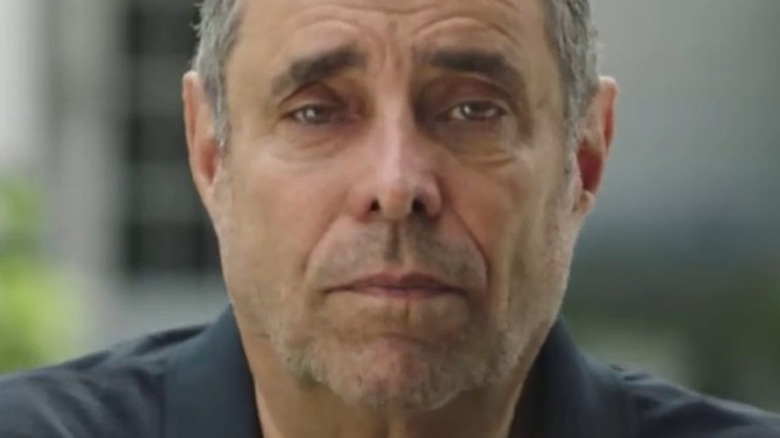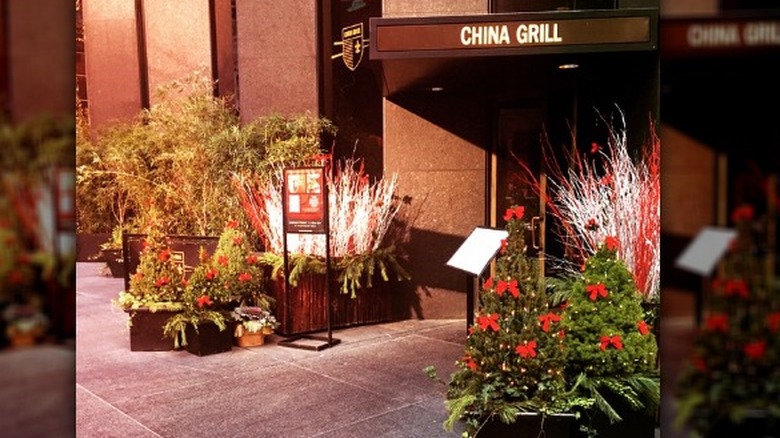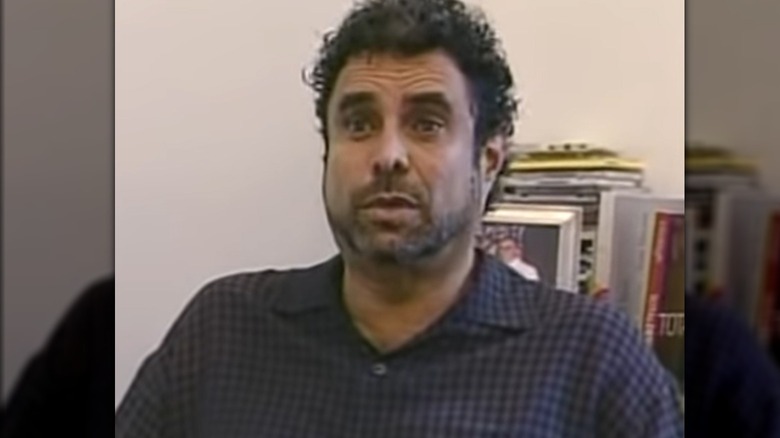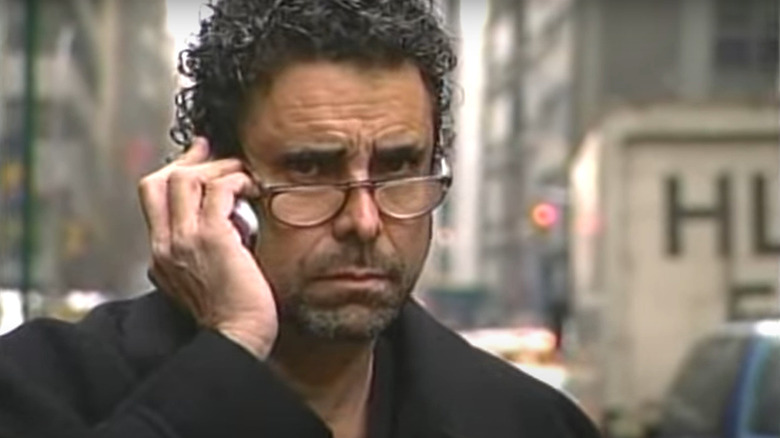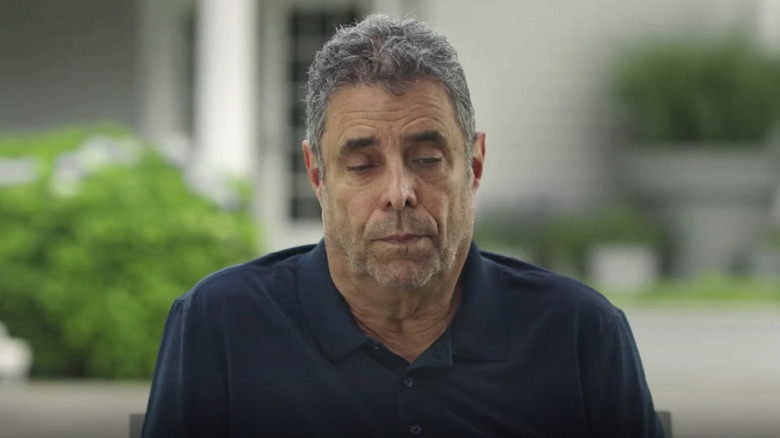The Truth About Jeffrey Chodorow From Bad Vegan
Jeffrey Chodorow is a financier who has not only owned several successful restaurants himself but has also provided the backing for many other well-known restaurants, including Sarma Melngailis' Pure Food and Wine, which appears in the Netflix documentary "Bad Vegan: Fame. Fraud. Fugitives." On the Netflix trailer, Pure Food and Wine is described as "the top raw vegan restaurant in the world" and Sarma Melngailis is deemed the "the vegan Bernie Madoff."
During the show, Chodorow proves a trusting investor to Melngailis, with a seeming connection to both Pure Food and Wine's mission and his belief in Melngailis to run the restaurant. Chodorow's interest in restaurants began at an early age in Miami and has since grown, leading to the development of various types of eateries across the country. Given his success, it seems that Chodorow has a strong work ethic, which viewers got a taste of on the reality TV show "The Restaurant."
Jeffrey Chodorow came from humble beginnings
Jeffrey Chodorow was born in the Bronx, but after his father passed away when he was a baby, his mother moved them to Miami Beach to live with his aunt. The sisters worked in a Cuban barbershop as manicurists and on weekends, they would visit Havana, Cuba. Unable to hire a babysitter, Chodorow's mother would take him on dates, exposing him to restaurant culture at an early age, which inspired Chodorow's "brainchild" restaurant Asia de Cuba in NYC.
A significantly serious time of Chodorow's childhood was the inspiration for his restaurant China Grill, as he told Black Book, "I knew the Asian and Cuban pantry, so it seemed like a natural." He shares his experience of the school drills during the Cuban missile crisis and remembers hiding under his desk. "I grew up very poor in a very wealthy Miami area ... some friends built a bomb shelter in their property which was nicer than our apartment," he recalled.
After growing up in Florida, Chodorow left Miami Beach to attend The Wharton School at the University of Pennsylvania and then Penn Law School before working in real estate and eventually moving to New York in 1981 (via New York Magazine).
Jeffrey Chodorow opened his first restaurant on a 'whim'
Jeffrey Chodorow was in Santa Monica, California for a meeting about potentially buying an NFL team when he decided to take his career in an entirely different direction and open a restaurant. The lunch meeting was held at Chinois on Main where Chodorow must have had a fantastic experience because the idea of owning the football team went out the window. He told Black Book, "Next thing I knew, I was back in New York, opening China Grill." This was in 1987, and the new restaurant was set in a building formerly owned by CBS, which was the home to four previously failed eateries (via New York Magazine).
Chodorow told Black Book he made two key decisions that led to the success of the restaurant: Moving the entrance to be set across from the MoMA and a Hilton hotel, and initially closing for lunch, therefore forcing clientele to eat at the restaurant for dinner. And successful it was, as according to New York Magazine, China Grill was a 'runaway hit' and raked in $7 million in its first year in business.
Jeffrey Chodorow fought back when his restaurants received poor reviews
In February of 2007, The New York Times critic Frank Bruni gave Chodorow's restaurant, Kobe Club, zero stars, writing in part," the food was disappointing; sometimes even infuriating, be it a rubbery roasted pork chop, perhaps left too long in its brine; limp iceberg lettuce, propped up insufficiently by blue cheese; those mashed potatoes, gluey; or a crème brûlée in dire need of a crunchier hood."
Chodorow fired back by taking out a full-page ad across from the food section in which he maintained that the food critics weren't qualified for their positions. He said that he and The New York Times went back and forth with edits. "I mean it's really funny: For people who believe in free speech, they hate when you attack them back," Chodorow said (via Haute Living).
But this battle wasn't over quite yet. In August 2007, Bruni also reviewed Chodorow's restaurant, Wild Salmon, for The New York Times, giving it one star. Chodorow took to his blog formally on the China Grill Management website to state that he found it "surprising" that Bruni focused much of the beginning of the review on the fact that his baked Alaska was missing a decorative element.
Jeffrey Chodorow provided the financial backing for Pure Food and Wine
When Matthew Kenney and Sarma Melngailis were looking for someone to help fund the vegan eatery, Pure Food and Wine, they turned to Jeffrey Chodorow. Melngailis said in the first episode of "Bad Vegan" this was because "he was well-known for having opened a lot of flashy restaurants in the city." While the principles behind Pure Food and Wine were new to Chodorow, he was willing to jump on board. "The concept was a vegan, raw food restaurant, which of course I had no idea what that was. I'm really attracted by new food ideas and new ways of doing things. Frankly, it was quite impressive, so I said, 'Okay, let's do it," Chodorow said in the documentary.
Eventually, after Kenney and Melngailis split both romantically and as business partners, Chodorow sold the restaurant to Melngailis, who took on approximately $2 million in debt to purchase Pure Food and Wine. A New York Post article claimed that after Kenney left the restaurant, he looked toward opening a new eatery and began poaching staff from Pure Food and Wine, for which Chodorow filed a lawsuit against the chef.
Jeffrey Chodorow was on a reality TV show
The reality TV show "The Restaurant" aired on NBC in the early 2000s and followed celebrity chef Rocco DiSpirito's efforts to open a successful New York City restaurant. Jeffrey Chodorow provided the financial backing for the eatery, Rocco's on 22nd, and when he wasn't pleased with the books DiSpirito and Chodorow went to battle.
While DiSpirito fought for control of the kitchen, Chodorow fought for profits, and the clash that resulted made for some good 'ole classic reality television. After lawsuits and counter lawsuits ensued, Eater reported that DiSpirito was eventually banned from the premises of the restaurant by the New York State Supreme Court, while Chodorow claimed to New York Magazine that the chef was in over his head doing business with him. "Rocco was stupid. What he did was like attacking a 900-pound gorilla. He blew a big opportunity with me," Chodorow said.
Jeffrey Chodorow did jail time
"Bad Vegan's" Sarma Melngailis was found guilty of stealing $1 million, which she served jail time for (via Eater). However, Pure Food and Wine's investor, Jeffrey Chodorow, doesn't have a clean rap sheet either. Chodorow also served four months after pleading guilty to 'two counts of obstructing justice for providing a false affidavit about the improper involvement of a partner in the management' of Braniff Airlines, a company he spent three years as the owner of (via The New York Times).
The partner in question was Scot Spencer, a convicted felon whom the Department of Transportation firmly maintained should not be involved with the business. Chodorow was forced to sign an affidavit stating that Spencer would have nothing to do with Braniff Airlines, however, it was later found that Spencer's involvement with the company was ongoing (via The Smoking Gun). The airline went bankrupt, and Chodorow not only did time in prison but was also forced to pay back millions to investors.
Jeffrey Chodorow's son follows in his father's footsteps
Since 2008, Jeffrey Chodorow's son, Zachary Chodorow, has been a director for his father's restaurant empire China Grill Management, which owns more than 20 eateries around the world. He is also the co-founder of RedFarm, a group that owns two RedFarm restaurants as well as Decoy, all located in Manhattan and all serving Chinese food.
The accomplished restauranteur is a founding trustee of the NYC Hospitality Alliance and a graduate of his father's alma mater, The Wharton School at the University of Pennsylvania, where he studied economics (via LinkedIn). Zachary may have had an in with his father's company, however, he paid his dues working his way up in the food business, operating a hot dog cart in the Hamptons after graduating from college. In the summer of 2008, the entrepreneur could be found peddling $20 Kobe hot dogs on the streets of East Hampton adjacent to the Lily Pond nightclub, then telling reporters that business was flourishing and he hoped to extend the enterprise to other clubs. Customers had their choice of unique condiments including spicy Asian ketchup and the cart also offered yuzu-ade beverages to wash it all down (via Insider). "Being a foodie has really paid off for the whole family," Jeffrey told Black Book.
